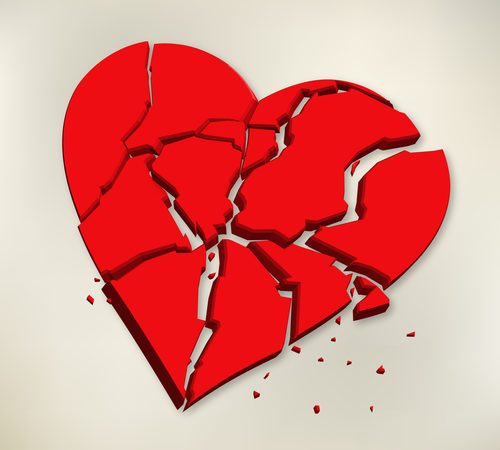
Anxiety of a Broken Heart: the Mind-body Connection
Much has been written about the mind-body connection; the body-warming, mind-relaxing endorphins emanating from exercise, the dopamine of romance, the gut- wrenching cortisol manifest from anxiety, trauma, etc.
The stress we are focusing on today is that of a broken heart. Yes, there really is broken heart syndrome. Its cause is the heart’s reaction to a surge of stress hormones, called takotsubo cardiomyopathy, apical ballooning syndrome or stress cardiomyopathy, according to doctors. (Harvard Women’s Health Watch)
Again, the mind-body connection.
Melissa Hill asks “Can Tylenol Help Heal a Broken Heart?” Her question may appear as glib and insincere (It isn’t). It illustrates this connection in a real –life experience. Here are excerpts of her story:
“He told me to stop by after I got out of the movie. We met in the parking lot outside his dorm and kissed hello, quickly, like something you do out of habit. I didn’t know then that it would be our last. He was tense, his eyes focused everywhere but on me.
I don’t remember exactly what he said, but he ended with: “I don’t think I can do this anymore.”
“My heart pounded as he gave his reasons. I listened but didn’t process. I stood there in the cold, swaying nervously from foot to foot, my hands shoved inside my jacket pockets. I tried to respond but stumbled over my words. Normally outgoing and talkative, I couldn’t even form a sentence. Warmth radiated from my flushed cheeks”.
“As a student of neuroscience, I have learned that the most intimate relationship is the one between your head and heart. They talk like best friends via the common carotid artery, which sends blood from the heart to the brain at a running speed of three feet per second”.
“The brain has developed mechanisms to sense danger, and it responds immediately in the presence of any threat. When a threat is identified, an emergency call is made to the hypothalamus, the command center for our hormone system”.
“The physiological response to a rejection is entirely different from that of a threat. We have an innate need for acceptance, just like we need water and food to survive. In a manner somewhat opposed to when we’re faced with a threat, rejection activates our parasympathetic nervous system”.
“A signal is sent through the vagus nerve from our brain to our heart and stomach. The muscles of our digestive system contract, making it feel as if there’s a pit in the deepest part of our stomach. Our airways constrict, making it harder to breathe. The
rhythmic beating of our heart is slowed so noticeably that it feels, literally, like our heart is breaking”.
“After hearing those fateful words of rejection in the parking lot, I went home and cried on the floor of my apartment, tucked into my best friend’s embrace”.
“But heartache is like any other pain, and it takes time to heal.
In research published in 2010, scientists found that acetaminophen can reduce physical and neural responses associated with the pain of social rejection, whether in romantic relationships, friendships or otherwise”.
“So if you’re hurting from heartache, try popping some Tylenol”.
“Recently, I broke someone else’s heart. I tried to end it with kindness and respect, but there was obvious strain and confusion in his eyes as his parasympathetic nervous system kicked into gear while I gave my reasons. I could imagine the muscles of his digestive system contracting, his heartbeat slowing”.
“I had been there. I knew he would be O.K.
I was hoping that someone else would think to give him Tylenol”.
(By MELISSA HILL, Modern Love, NY Times, JUNE 3, 2016)
Yes, your broken heart will heal, but you need not go through this alone.
This is where Counseling on Demand comes in. We can help you through; sharing your pain. Talk therapy is not just talk. It’s the relationship itself that heals.
We are online at CounselingonDemand.com.
We are only a click away.